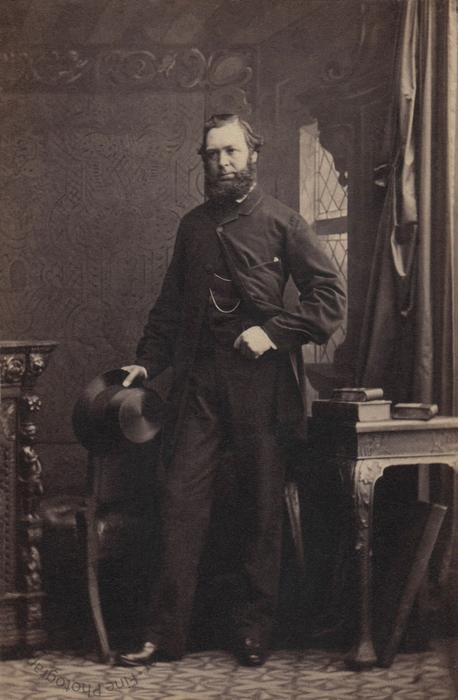Isaac Wilson
(1822-1899)
21 July 1862
Volume 8, page 208, sitting number 10,740.
The industrialist and Liberal politician Isaac Wilson was born on 16 February 1822 at Kendal in Westmorland, the son of woollen manufacturer Isaac Wilson and his wife Mary née Jowitt.
As a young man, he managed a pottery on Commercial Street in Middlesbrough, but later he established, with partner Edward Gilkes, the Tees Engine Works at the corner of Commercial Street and Grey Street, which manufactured locomotives and various products for railway engineering on Teesside. Wilson was also a director of the Stockton and Darlington Railway. At the time of the 1861 census he gave his profession as ‘Iron Master and Earthenware Manufacturer.’ In 1865 the firm merged into a larger concern known as Hopkins, Gilkes & Co.
On 9 June 1847 at the Zion Chapel in Kendal he married Anna Dorothy Benson, daughter of Robert Benson of Parkside. Their marriage produced at least five daughters and one son (1861 census).
In 1854 he became the Mayor of Middlesbrough. He was later in involved in local politics, and at a by-election in July 1878 he was elected as the MP for Middlesbrough. He held the seat until he stood down on the grounds of ill health at the general election of 1892. From 1879 to 1887 he was the President of the Teesside Chamber of Commerce.
Isaac Wilson died, aged 77, on 22 September 1899 at Nunthorpe Hall, his residence since 1850. He was buried in Great Ayton Cemetery, North Yorkshire.
According to his lengthy obituary in The Engineer (29 September 1899): ‘The death on the 22nd inst. of Mr. Isaac Wilson, of Nunthorpe Hall, near Middlesbrough, removes another of the few remaining pioneers of the Cleveland iron trade. He was one of the earliest in that district to engage in the manufacture of pig iron; and he has continued closely connected with it till his death. Few men took a more prominent part in furthering in various ways the trade of Teesside; and his services have been several times recognised by the town and trade of Middlesbrough, which has been the centre of his business operations. […] Few men have died more full of deserved honours than Mr. Wilson, and he lived to see the full fruition of his enterprise. His funeral at Great Ayton was attended by the leading men of the district, many of whom had worked side by side with him in developing the trade of Middlesbrough, and were thus able to appreciate fully the value of his genius.’

